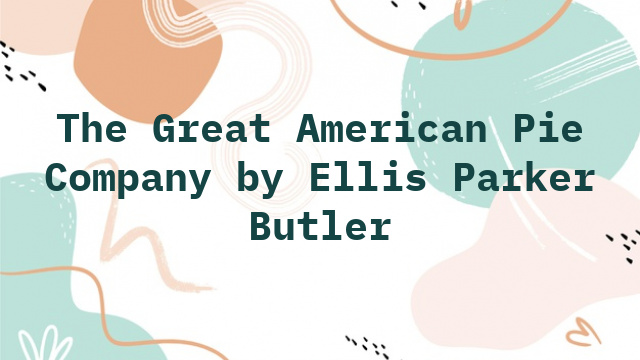
The Great American Pie Company by Ellis Parker Butler
CHAPTER THREE
“I reckon you see now how your plan would work out,” said Phineas; “we’d give away nigh on to a thousand pies, an’ all because we didn’t use hoss sense. I’m ag’in’ trusts, same as you. I’d vote any day to down any o’ them big fellers, but a little private agreement between gentlemen don’t hurt nobody. What I say is, git together an’ fix on a fair price an’ stick to it.”
“Jest what I say,” said Eph. “You lift your price up to ten cents–“
“Never in this green world,” said Phineas. “Contrariwise, you drop your grade of pie down equal to mine, an’ put your price down to eight cents.”
“Not so long as I live!” said Eph.
“Well, then,” said Phineas, “it stands this way. If we leave our prices as they be, it means fight an’ loss to us both, an’ we won’t change em, so what’s to be done?” Eph looked out over the river gloomily.
“Dog me if I know,” he sighed. “There’s just one thing,” said Phineas. “We got to form a stock company, you an’ me, an’ put all our earnings together, an’ then, every so often, divide up even. Then if I sell more pies because mine are eight cents, you’ll git your half of all I sell; an’ if you sell more because your pies are bigger an’ better, I’ll get my share of what you sell. An’ when things git goin’ all right, we’ll raise up the price all around–say, my pies to ten cents an’ yours to twelve; an’ bein’ in cahoots, there won’t be nobody to say we sha’n’t do it, an’ we’ll lay aside that extra profit to build up the business.”
“Phineas,” said Eph, solemnly, “it’s a wonder I didn’t think o’ that myself.”
“Ain’t it, now?” asked Phineas. “But I ‘ve give this thing some thought, an’ I ain’t begun to tell you where it ends. I wanted to see how you took to it before I let it all out on you.”
Eph leaned forward eagerly. “Go on,” he said. “Let it out on me now.”
“When the only two homemade pie-makers git together like we’ll be,” said Phineas, triumphantly, “I’d like to know who’ll stop us from liftin’ up the price. Huh! Them that don’t like to pay our prices, they can eat bakers’ pies an’ welcome.”
“I know some folks in this town,” Eph said, “that wouldn’t eat bakers’ pies if they had to pay twenty-five cents apiece for homemade.” He paused to consider this pregnant statement, and then added: “But I reckon the bakers would git away a heap of our trade if we begun liftin’ our prices much.” Phineas’s eyes snapped.
“They would, hey?” he said, laughing. “Mebby they would an’ mebby they wouldn’t. What do you suppose we’d be doin’ with that surplus we’d accumulate? Come strawberry season, we’d up an’ buy every strawberry that come to Gloning. We’d pay more than anybody could afford to, an’ add the difference to our strawberry-pie price, because we’d have the only strawberry pies in town. An’ what strawberries we couldn’t use right off we’d can for winter pies. An’ as other fruits come in, we’d buy them up the same way. But we wouldn’t be mean. We’d open a fruit-store an’ sell folks fruit at a good high price if they’d sign an agreement not to use any fer pie. An’ in a little while the bakers would git sick an’ sell out their shops to us fer almost nothin’. An’ then we’d go into the bakin’ business big.”
“We’d bake cakes an’ bread then,” said Eph, eagerly.
“Cakes an’ bread an’ doughnuts an’ buns an’ everything,” said Phineas, with enthusiasm. “We’ll git one big bake-shop an’ save on expenses, an’ shove up the price of stuff a little, an’ just coin money.”
“We’d ought to git at it quick,” said Eph. “We’d oughtn’t to waste no time. What do you reckon would be a good name fer the company?”
“I’ve fixed that all up,” said Phineas. “We’ll call it the American Pie Company, Incorporated; an’ bein’ as only you an’ me will be in it, we’ll each have to be officers.”
“I’m goin’ to be president,” exclaimed Eph, with all the eagerness of a boy.
“All right, Eph,” said Phineas. “We don’t want to have no more fights, an’ I want to do what’s right, so you can be president. I’ll be treasurer.”
Eph thought for a minute. He knew Phineas well.
“I want to do what’s right, too,” he said at last. “You can be president. I’ll be treasurer.”
“I guess mebby we’d better take turns bein’ treasurer,” suggested Phineas.

“All right,” said Eph; “I want my turn first.”
CHAPTER FOUR
When the two men had settled the treasurer question, they smoked awhile in silence, each lost in thought; and as they thought their brows clouded.
“Say, Eph,” said Phineas at length, “what be you thinkin’ that makes you look so glum?” Eph shook his head sadly.
“I been lookin’ ahead, Phin,” he said–“‘way ahead. An’ I see a snag. I don’t hold it ag’in’ you, Phin; but the thing won’t pan out.” “What–what you run up ag’in’, Eph?” asked Phineas, solicitously.
“Fruit,” said Eph, dolefully. “Loads of it. Phin, what if we _do_ gather in all the fruit that comes to town? Ain’t there just dead loads an’ loads o’ fruit in these here United States? An’ the minute we git to puttin’ up the price, it’ll git noised about, an’ Dagos an’ Guinnies’ll pile in here with fruit an’ cut under us.” He sighed. “‘Twas a good business while it lasted, Phin; but it didn’t last long.” Phineas lay back on the grass and laughed long and squeakily.
“Is _that_ all the farther ahead you looked, Eph Deacon?” he asked when he had recovered his breath. “Any old fool ought to know that the second year we was in business we’d buy up all the fruit in the United States.”
Eph’s face cleared and he smiled again, but Phineas’s face clouded.
“What worried me, Eph,” he said, “was ’bout payin’ sich high prices for fruit as them blame farmers would likely ask. Ner I won’t stand it, neither. Will you?”
“Not by a blame sight, Phin,” said Eph. “I won’t let nobody downtrod me. But,” he asked anxiously, “how you goin’ to stop it?”
Phineas dug his heel in the soft turf.
“We got to buy out the farms,” he announced decisively, “an’ hire the farmers to run ’em.”
“Think we can afford it, Phin?” asked Eph. “We don’t want to go puttin’ our money into nothin’ losing?”
“We got to afford it,” said Phin. “We’re in this thing so deep now we can’t go back. An’ we’ll need part o’ the farms, anyhow, fer our wheat.”
“Our wheat?” said Eph, puzzled. “Be we goin’ to sell wheat, Phin?”
“Sell wheat?” said Phin, with disgust. “No such fools. Won’t we need all the wheat this country can grow to keep our big flourmills rannin’? When we own all the flour-mills in the country, it stands to reason we’ll have to own all the wheat, don’t it?”
Eph looked at his companion with open mouth.
“Mills!” he ejaculated. “What fer do we want to own all the mills?”
Phineas waved his hand in the air.
“‘Tain’t ‘want to,'” he said decisively, “it’s ‘have to.’ I didn’t say we’d buy all the mills, because I thought you’d surely see fer yourself that we’d have to buy them.”
“Now, I ain’t kickin’, Phin,” said Eph, in a conciliating tone; “if you say buy the mills, we’ll buy ’em. I’m ready an’ willin’ any time you are. All I ask is, Why? That’s all I ask–Why?”
“Well, sir,” explained Phineas, “if our bakery here puts up the price of bread, the outside bakeries will ship in bread, if we don’t buy out the outside bakeries. An’ once we start, we’ve got to buy out every bakery in the country. An’ when we do that we’ve got to own all the mills, so no one else can get any flour to start bakin’. An’ to keep anybody else from startin’ mills, we’ve got to own all the wheat-belt. It’s only right to be on the safe side, Eph.” Eph crossed his knees and smoked silently, nodding his head slowly the while.
“I dassay you’re right, Phin,” he admitted at length; “but you ain’t far-seein’ enough. S’pose–just s’pose, fer instance–it come time to ship a lot o’ flour from our mills to our bakeries, an’ them lumber fellers up North wouldn’t furnish timber to supply our barrel-factories.”
Phineas laughed.
“We’d use sacks,” he said shortly.
“Well,” said Eph, “s’pose–just s’pose, fer instance–that ’bout the time we needed cotton to run our cloth-mills to make sacks fer our flour–” He paused. “We would run our own cloth-mills, wouldn’t we, Phin?” he asked.
“Surely, surely,” replied Phineas.
“All right,” continued Eph. “S’pose them cotton-growers down South an’ them timber-growers up North wouldn’t let us have no cotton or no timber. What then?”
Phineas nodded that he comprehended the wisdom of the deduction.
“You’re right, Eph,” he said. “American Pie has got to buy out the timber-belt an’ the cotton-belt. I’m glad you thought of it. It shows you take an interest in the business, even if you did interrup’ me when I was thinkin’ on a mighty important point.”
“What’s that?” asked Eph. “We got to buy out the railroads,” said Phineas. “Once we own them, we can get proper freight rates.”
“Ain’t you afraid mebby some of them foreign countries ‘ll ship in flour or fruit or crackers?” asked Eph.
“How can they when we put the tariff up, like we will?” asked Phineas. “Course, while we’re buyin’ up these other things, we’ve got to buy up Congress.”
“Phin!” exclaimed Eph, suddenly, “we’ll have a dickens of a tax-bill to pay.”
“We’ll swear off our taxes,” said Phineas, shortly.
Eph relapsed into meditation. “Why, Phin,” he said at length, “we’ll be as good as bosses of these United States, won’t we?”
“Surely we will,” Phin replied.
“Do you suppose I’m doin’ all this work an’ takin’ all this worry just fer the money? What do I care fer a few millions more or less, Eph, when I’ve got millions an’ millions? What I want is power. I want to have this here nation so that when I say, ‘Come!’ it will come, an’ when I say, ‘Go!’ it will go, an’ when I say, ‘Dance!’ it will dance.”
He stood up and inflated his thin breast, and tapped it with his forefinger.
“Eph,” he said, “with this here American Pie Company goin’, you an’ me can go an’ say to them big trust men, ‘Eat dirt,’ an’ they’ll eat it an’ be glad to git off so easy. We can–“
He paused and glanced up the road uneasily. He shaded his eyes and looked closely at the distant figure of a stout woman who was waddling in their direction.
“Skip!” he exclaimed; “here comes your wife!”

Eph rolled over and made a dash on his hands and knees for his basket of pies. Phineas was already walking rapidly up the road.




